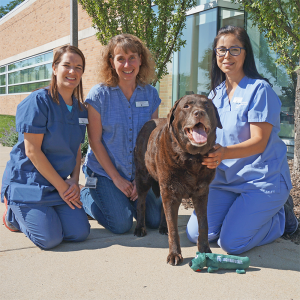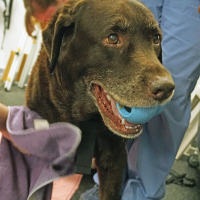
Bentley Jack Boeckmann has been a Spartan dog since he was 8 weeks old. Now, as an active, 12-year-old male, neutered Lab, Bentley’s MSU toys are still his favorites. However, what Bentley seems to like even more than his toys are his friends at the MSU Veterinary Medical Center.
Bentley’s owner, Jen Boeckmann, brought him to the Hospital three years ago to receive acupuncture from Elizabeth Carr, DVM, DACVIM, PhD, DACVECC, CVA (certified acupuncturist), hopeful that it would provide Bentley with some relief from his osteoarthritis (OA).

The acupuncture helps control and ease his OA symptoms. OA is an incurable, chronic inflammatory condition caused by the deterioration of joint cartilage. Older dogs are at higher risk of OA and prolonged abnormal development of the joints and cartilage and being overweight are contributing factors.
To further help with his OA pain and the compensatory changes that occur in the rest of his musculature, Boeckmann brings Bentley to the Hospital’s Rehabilitation Service each week for therapy. The Service is led by Sarah Shull, DVM, CCRT (certified canine rehabilitation therapist).

“Since OA is a chronic, progressive disease, the goal of acupuncture treatment is pain relief and management,” says Carr. “For Bentley, the results of combining acupuncture and rehabilitation have been nothing but positive, as they work together to reduce the significance of his pain and enhance his overall health and quality of life.”
While at the Dr. Elwood and Linda Collins Rehabilitation Center, Bentley uses an underwater treadmill, which helps to ease his muscular pain, improve his range of motion and joint health, and is a healthy, low-impact way for him to exercise. Hydrotherapy also allows him to build his endurance in a safe OA way, which is especially important for Bentley because in addition to OA, he has Geriatric Onset Laryngeal Paralysis and Polyneuropathy (GOLPP).

GOLPP is a degenerative disease that tends to affect older, large-breed dogs. Gradual degeneration of the motor nerves results in clinical signs of weakness. GOLPP can affect any motor nerve; clinical signs include muscle trembling and weakness and abnormal swallowing. Rehabilitation therapy helps slow down Bentley’s muscle weakness and generalized muscle wasting.
“Since the Rehabilitation Service has tailored Bentley’s exercise regimen to focus on managing and improving the symptoms of both his OA and GOLPP, his endurance has improved, his limbs have a wider range of motion, and he moves with greater ease,” says Shull.
Other common GOLPP symptoms include audible respiratory distress (often in the form of a harsh or grating sound) and dyspnea (difficult or labored breathing), caused by degeneration of the nerve that innervates (supplies nerves to) the larynx. This can result in exercise intolerance, throat clearing, and if severe laryngeal dysfunction is present, collapsing.

Though GOLPP is a progressive condition without a cure, symptoms can be managed, it isn’t painful, and affected dogs remain bright, alert, and happy. While surgery is sometimes required to improve airway function, rehabilitation therapy is very effective in maintaining a superior quality of life, especially for those who also have orthopedic diseases, like OA.
Bright, alert, and happy is exactly what Bentley is, according to Boeckmann. “I can tell that he looks forward to his weekly MSU visits.” As a regular visitor to the Hospital, Bentley not only benefits from acupuncture and hydrotherapy, but he performs conditioning exercises to further strengthen his hind-end, receives therapeutic laser treatments to address his muscle aches and inflammation, and gets massage therapy to keep his muscles loose and comfortable.

“The quality of care that Bentley receives from the MSU Veterinary Medical Center has gone way above and beyond my expectations,” says Boeckmann. “Through the Hospital’s integrative medical and rehabilitative treatments, Bentley has proven that any dog with an incurable disease has the capacity to not only live but live a great life—and even learn a new thing or two.”
